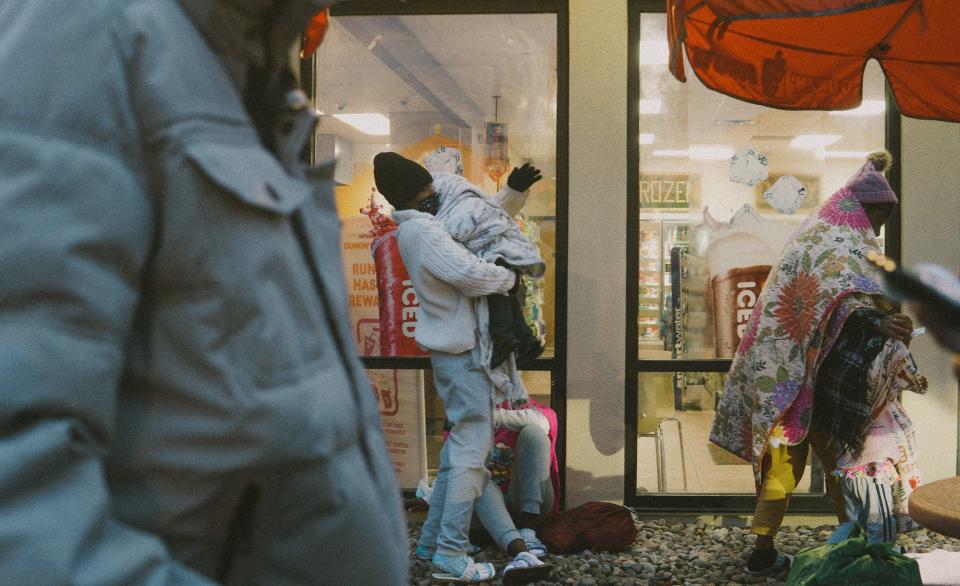USA Today Network reporters get national award nod for asylum seekers project
USA Today Network journalists Robert Bell and Eduardo Cuevas were honored as runners up in the 2024 Headliner Awards, a national journalism competition, for their work covering asylum seekers at the Northern New York border with Canada.
Amid a wave of backlash to asylum seekers settling across New York last summer, the project humanized the faces behind the statistics and gave readers essential context to more fully understand the asylum seekers’ presence in New York.
It won second place in the Headliner contest's print and photo division, in the "local news beat coverage or continuing story not in a Top 20 media market" category.
The Headliner Awards, founded in 1934 in New Jersey, is one of the oldest annual journalism competitions in the nation, awarding thousands of print, audio and broadcast reporters, visual journalists, graphic designers and newspapers, magazines and television/radio stations for their outstanding journalism.
Robert Bell is the Changing Neighborhoods and Cultural Trends Reporter for the Democrat and Chronicle, a Rochester-based USA Today Network newspaper. He has a background in videography and filmmaking.
Eduardo Cuevas, formerly of the New York State Team, covers breaking news for USA Today.
"As journalists, part of our role is to help our readers gain perspective on diverse communities they may not be familiar with," USA Today Network's New York State Team Editor Sarah Taddeo said. "The dreams and struggles of asylum seekers are a mystery to many New Yorkers. Bell and Cuevas' project revealed, in a sensitive yet hard-hitting way, the humanity of these families who just wanted safety and a hope for the future."
Read Northern Border project here At NY's northern border, asylum seekers find hope in desperation at a rural mini mart
Project revealed desperation, hope of a misunderstood population
The project took the two journalists to a remote mini mart near Plattsburgh last spring, which acted as a sort of waypoint for asylum seekers from Venezuela, Haiti, Uzbekistan and everywhere in between to strategize how to make it to Canada. Many of them had come to the U.S. looking for better opportunities, but felt the grindingly slow immigration process and lack of job prospects meant they should keep looking elsewhere.
Around that time, the Canadian and U.S. governments had shut down Roxham Road, an unofficial border crossing in that area, forcing asylum seekers to seek entry at official crossings, stay in the U.S. or try Roxham Road anyway.
Cuevas and Bell spent weeks researching the story to identify spots like the mini mart where they could intercept asylum seekers to seek interviews and capture images of the oft misunderstood and stereotyped population. They found success, connecting with a group of Venezuelan and Columbian individuals who slept on a bed of gravel outside the mini mart at 5 a.m. on a drizzly, 40-degree morning. Their small children in tow, the group hoped to get a cab and try for Roxham Road — only some would make it through.

With the help of local advocates and Cuevas’ ability to converse with Spanish-language speakers, the reporting pair was able to document compelling stories of determination and hope, with the sensitivity and dignity the story and sources deserved.
The project revealed, in a raw way, the desperate plight of thousands of people who, under the radar of most everyday New Yorkers, spent their waking moments just trying to belong and put down roots in safety.
"It was about a year ago when Eddie and I were in Plattsburgh reporting and the stories of those people and families still stick with me," Bell said. "I don't think either one of us do the work to win awards, but I hope some national recognition gets more eyes on our report and people can approach this issue with more empathy and a better understanding of the the plight of asylum seekers. Most of all, I wish the best for the sources who were brave enough to speak with us."
This article originally appeared on Rochester Democrat and Chronicle: D&C, USA Today reporters get national award nod for migrant project

